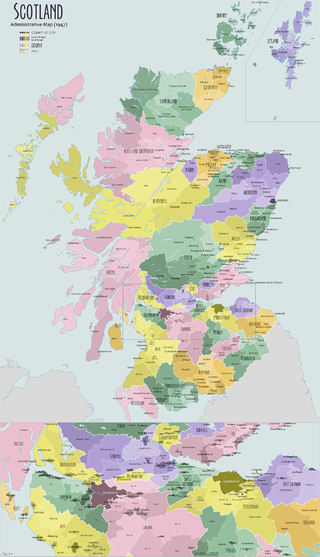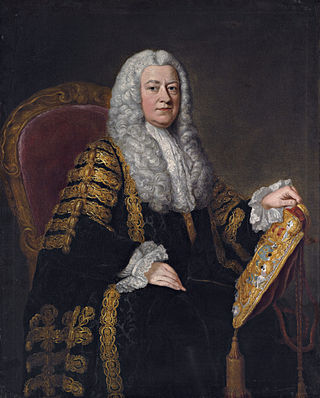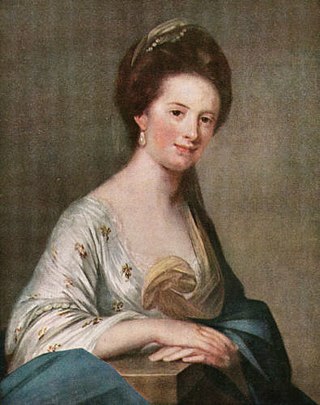Related Research Articles

The Shires of Scotland, or Counties of Scotland, were historic subdivisions of Scotland.

Philip Yorke, 1st Earl of Hardwicke, was an English lawyer and politician who served as Lord High Chancellor of Great Britain. He was a close confidant of the Duke of Newcastle, Prime Minister between 1754 and 1756 and 1757 until 1762.

The County of Bute, also known as Buteshire, is a historic county and registration county of Scotland. Now replaced by Argyll and Bute for the Isle of Bute, with the Argyll and Bute Council. The Isle of Arran and the The Cumbraes are now in North Ayrshire Council area. Since the implimentation of the Local Government etc. (Scotland) Act 1994, on the 1 April 1996.

The Act of Proscription, also called the Act of Proscription 1746 or the Disarming the Highlands, etc. Act 1745, was an Act of the Parliament of Great Britain, which came into effect in Scotland on 1 August 1746. It was part of a series of efforts to assimilate the Scottish Highlands, ending their ability to revolt, and the first of the "King's laws" that sought to crush the clan system in the aftermath of the Jacobite rising of 1745. These laws were finally repealed on 1 July 1782.
In Scots law, jus relictae is the right of the surviving spouse in the moveable property of the deceased spouse. Jus relictae is the term used for a surviving wife, and jus relicti is the term used for a surviving husband. The similar right for any surviving children is referred to as legitim.

In Scotland a sheriff principal is a judge in charge of a sheriffdom with judicial, quasi-judicial, and administrative responsibilities. Sheriffs principal have been part of the judiciary of Scotland since the 11th century. Sheriffs principal were originally appointed by the monarch of Scotland, and evolved into a heritable jurisdiction before appointment was again vested in the Crown and the monarch of the United Kingdom following the passage of the Heritable Jurisdictions (Scotland) Act 1746.

Alluvion, is a Roman law method of acquisition of heritable property (land). The typical cause is sediment (alluvium) deposited by a river. This sediment, legally termed the accessory, accreses a piece of land, the principal and thus accedes to the ownership of the principal land over time.

A sheriffdom is a judicial district in Scotland, led by a sheriff principal. Since 1 January 1975, there have been six sheriffdoms. Each sheriffdom is divided into a series of sheriff court districts, and each sheriff court is presided over by a resident or floating sheriff. Sheriffs principal and resident or floating sheriffs are all members of the judiciary of Scotland.
A burgh of regality is a type of Scottish town.

Mary Hay, 14th Countess of Erroll was a Scottish noblewoman and suo jure Countess of Erroll. As 18th Hereditary Lord High Constable and Knight Marischal of Scotland, she was the Senior Great Officer among the Royal Officers of Scotland and Chief of the King's Household in Scotland. She inherited these titles in 1717 on the death of her unmarried brother, Charles Hay, 13th Earl of Erroll.

The Scottish Gaelic word clann means children. In early times, and possibly even today, Scottish clan members believed themselves to descend from a common ancestor, the founder of the clan, after whom the clan is named. The clan chief is the representative of this founder, and represents the clan. In the Scottish clan system, a chief is greater than a chieftain (ceann-cinnidh), a designation applied to heads of branches of a clan. Scottish clans that no longer have a clan chief are referred to as armigerous clans.
Events from the year 1747 in Great Britain.

Scots property law governs the rules relating to property found in the legal jurisdiction of Scotland.

William Crichton-Dalrymple, 5th Earl of Dumfries, 4th Earl of Stair, KT was a Scottish peer. He inherited the title of Earl of Dumfries in 1742, upon the death of his mother Penelope Crichton, 4th Countess of Dumfries. He also held the heritable position of the Sheriff of Clackmannan from 1742 until heritable sheriffdoms were abolished in 1747.

The Heritable Jurisdictions (Scotland) Act 1746 was an Act of Parliament passed in the aftermath of the Jacobite rising of 1745 abolishing judicial rights held by Scots heritors. These were a significant source of power, especially for clan chiefs since it gave them a large measure of control over their tenants.

In the Baronage of Scotland, a Lord of Regality is an ancient noble title. Lords of regality were said to hold a regality - a type of territorial jurisdiction under old Scots law. This jurisdiction was created by erecting lands in liberam regalitatem, and the area over which this right extended became the regality.

General John Leslie, 10th Earl of Rothes KT was a senior British Army officer who became Commander-in-Chief of the Royal Irish Army between 1758 and 1767.

The judiciary of Scotland are the judicial office holders who sit in the courts of Scotland and make decisions in both civil and criminal cases. Judges make sure that cases and verdicts are within the parameters set by Scots law, and they must hand down appropriate judgments and sentences. Judicial independence is guaranteed in law, with a legal duty on Scottish Ministers, the Lord Advocate and the Members of the Scottish Parliament to uphold judicial independence, and barring them from influencing the judges through any form of special access.

In the United Kingdom, the Great Officers of State are traditional ministers of the Crown who either inherit their positions or are appointed to exercise certain largely ceremonial functions or to operate as members of the government. Separate Great Officers exist for England and Wales, Scotland, and formerly for Ireland, though some exist for Great Britain and the United Kingdom as a whole.
References
- ↑ One or more of the preceding sentences incorporates text from a publication now in the public domain : Chisholm, Hugh, ed. (1911). "Heritable Jurisdictions". Encyclopædia Britannica . Vol. 13 (11th ed.). Cambridge University Press. p. 364.
- ↑ "Abolition of Heritable Jurisdictions Act | Great Britain [1747] | Britannica". www.britannica.com. Retrieved 26 September 2024.